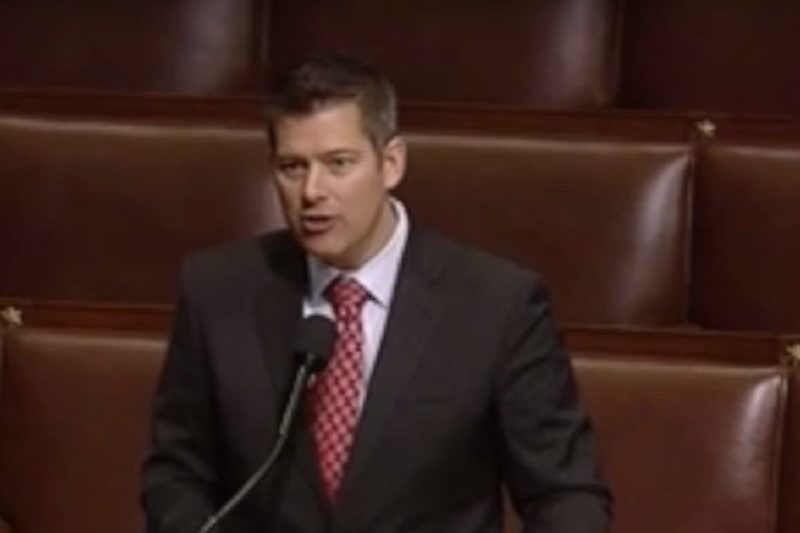Group Calls Out Wisconsin Congressman Whose ‘Concern for Life Ends’ When ‘the Umbilical Cord Is Cut’
In Our Own Voice: National Black Women’s Reproductive Justice Agenda launched an ad campaign to call out Rep. Sean Duffy’s (R-WI) suggestion that members of the Congressional Black Caucus aren’t “standing up for their communities” if they support abortion access.

A reproductive justice group unveiled a new ad campaign Monday designed to call out Rep. Sean Duffy’s (R-WI) suggestion that members of the Congressional Black Caucus aren’t “standing up for their communities” if they support abortion access.
The group has launched a six-figure ad buy aimed at addressing Duffy’s comments. The weeklong campaign includes homepage takeovers on the websites of major Washington, D.C. publications, including The Hill, Politico, Roll Call, and an ad buy in the Washington Post.
The group, In Our Own Voice: National Black Women’s Reproductive Justice Agenda, was founded to address reproductive justice while “incorporating the intersections of race, gender, class, sexual orientation, and gender identity with the situational impacts of economics, politics, and culture that make up the lived experiences of Black women in this country.”
“Congressman Duffy is just one example of a politician whose pro-life agenda ends after birth,” said Marcela Howell, founder and president of In Our Own Voice, according to a press release. “He and his pro-life colleagues repeatedly vote against black women and children—from Medicaid expansion and minimum wage increases to access to contraception, medically-accurate sex education and affordable access to abortion. The pro-life agenda puts black women at risk, and it’s long past time to end the hypocrisy.”
Duffy, speaking on the floor of the House of Representatives in January, accused members of the Congressional Black Caucus of not standing up for Black communities when they support abortion rights.
“I hear a lot in this institution from minority leaders about how their communities are targeted. But what I don’t hear them talk about is how their communities are targeted in abortion,” said Duffy, who sports a 100 percent rating from the anti-choice group National Right to Life Committee. “There is a targeting going on in a lot of spaces and a lot of places, and it is going on in the abortion industry. And my friends, my liberals, Congressional Black Caucus members, talk about fighting for the defenseless, and the hopeless, and the downtrodden. But there is no one more hopeless and voiceless than an unborn baby. But their silence is deafening. I can’t hear them. Where are they standing up for their communities, advocating and fighting for them, their right to life?”
Duffy in September 2015 introduced the misleadingly named “Women’s Public Health and Safety Act,” which would have allowed states to stop working with health-care providers through Medicaid if those providers offer abortion care.
Duffy’s comments are just one example of a “hypocritical” anti-choice agenda that “puts black women at risk,” according to the In Our Own Voice press release.
The organization’s website points to policy issues opposed by anti-choice politicians that could help Black communities, including Medicaid expansion, raising the minimum wage, and bolstering access to contraception and affordable abortion care.
Speaking about Duffy’s criticism of Black lawmakers, fellow Wisconsin Rep. Gwen Moore (D), a member of the Congressional Black Caucus who proposed a bill in February aimed at reducing infant mortality, questioned why the Republican had not supported measures that would help the “hopeless and voiceless” he claimed to have spoken about.
“Representative Duffy’s hypocrisy on this issue is as predictable as it is offensive,” Moore said on the House floor in January. “If he truly believes that we all should be fighting for the ‘hopeless and voiceless’ among us, why doesn’t he stand with us as we defend Planned Parenthood, an organization committed to ensuring all communities, and especially those most in need, have access to high-quality care? Where was his support when my Congressional Black Caucus colleagues and I tried to secure greater funding for SNAP, WIC, and Head Start? Where was his advocacy when we needed Republican support to ensure that we have highly trained and qualified school personnel like social workers and counselors for our most vulnerable students?”
“It’s painfully obvious that Representative Duffy’s concern for life ends as soon as the umbilical cord is cut,” Moore continued.
